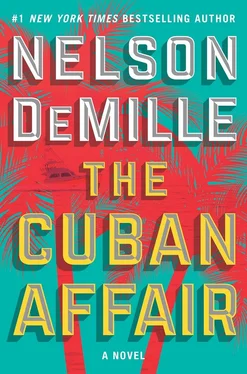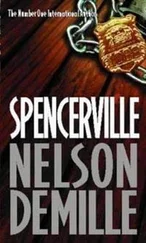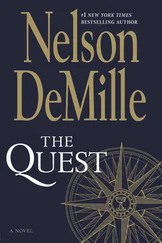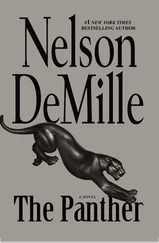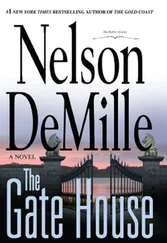Or... I could listen to what Carlos and his amigos had to say. As I used to say to my men, you gotta die someplace. And Cuba was as good a place to die as Afghanistan. And maybe that was better than wasting away here in Margaritaville, or on Wall Street, or in Portland. Lots of options. None of them good. Except maybe the Cuba option. Maybe this was my lucky day. Maybe not.
Jack wheeled a cart alongside The Maine and called out to me, “Are those Beaners onboard yet?”
Well, if they were, they’d take offense and leave. Jack Colby does not embrace political correctness, cultural diversity, gender equality, or whatever is in fashion at the moment. He’s okay, though, with Key West’s gay and transgender population. “Everybody’s gotta get laid,” he believes.
Jack and I unloaded the cart, and I saw he’d scored two bottles of contraband Cuban rum — a liter of Ron Caney and a liter of Ron Santiago. He’d also bought Coca-Cola, limes, a bag of ice, and God-awful snacks. The Maine is not a party boat, per se, but I’ve had some interesting charters over the years, including a few drunken orgies. The captain and mate can’t drink, of course, but we can get laid at anchor. This job does have its moments.
We stowed everything below and Jack went topside, sat in the fighting chair, and lit a cigarette. He asked, “Who are these people?”
I opened a can of Coke and sat in the opposite chair. “The guy I met in the Parrot is a Miami lawyer named Carlos. There are two other people. One is a woman.”
“Why did this guy want to meet you at the Parrot just to talk about a sunset cruise?”
“He wanted to see the famous Green Parrot.”
“Yeah?” Jack took a drag on his cigarette. After three years of working for me, he knows he asks more questions than I care to answer, but before the Cubans arrived I’d tell him about the fishing tournament. And the other job.
Jack Colby was about seventy, tall, lanky, and in pretty good shape. His thinning brown hair was long and swept back, he had a perpetual three-day stubble, and his skin looked like it had been left in the toaster oven too long. Jack always wore jeans and sneakers, never shorts or flip flops, and today he’d chosen his favorite “I Kill People” T-shirt.
I suggested, “The Maine T-shirt I gave you would be good tonight.”
“Yes, sir.”
He doesn’t mean “yes,” and he doesn’t mean “sir.” He means “Fuck you.” Sometimes he calls me “Captain,” and I never know if he’s using my former Army rank or my present title as a licensed sea captain. In either case he means “Asshole.”
Jack had been an enlisted man in the Army, and no matter how short a time you served, the military pecking order stays with you all your life, and as Jack would sometimes remind me, “You are an officer and a gentleman by an act of Congress, but an asshole by choice.”
The military also discourages fraternization between officers and enlisted men, and that, too, stays with you, but Jack and I share the unbreakable bond of combat — same mud, same blood — and though we rarely socialize, we’re friends.
Jack asked, “How much did you clip them for?”
“Two thousand.”
“Good score.”
“I’ll split it with you.”
“Thanks. I hope this Cuban broad is a looker.”
“She’s a Cuban American lady. And what do you care? You’re so fucking old, the only thing you can get hard is your arteries.”
Jack laughed. “Yeah? And I think you spent too much time in the foxhole with your gay soldiers.”
I think we’ve been together too long, and I notice that when I’m around Jack, I use the F-word more than I usually do, and I mimic his wiseass attitude. I hope he’s not rubbing off on me. I’ve got enough problems.
When Jack Colby first came aboard The Maine looking for a job, wearing a T-shirt that said: “Wounded Combat Vet — Some Reassembly Required,” he said he’d heard I was ex-Army, and in lieu of a résumé he showed me his DD-214 — his Army discharge paper — which he kept neat and safe in a plastic case, as it was an important document, loaded with military acronyms that defined his service. Box 13a told me that he’d been honorably discharged in 1969, and another box showed me he’d served a year overseas. Among his decorations, medals, and commendations was the Vietnam Service Medal, the Combat Infantry Badge, the Bronze Star, and a Purple Heart. I recalled that his home of record was Paterson, New Jersey, and that his last duty station had been Fort Benning, Georgia. Jack’s service number had an RA prefix, indicating Regular Army, meaning he’d volunteered for a three-year stint. His MOS — Military Occupation Skill — was 11-B, meaning infantry, and his Related Civilian Occupation said, “None.” Same as mine. He’d attained the rank of Private First Class, which is not much rank after three years and a tour in Vietnam, and I deduced that he’d either been busted or he had a problem with authority. Probably both. But he had received the Bronze Star for valor and a Purple Heart, so I hired him.
I imagine that Carlos knew that Jack was ex-military when he was searching for idiots to go to Cuba, and I also wondered if Jack would be up for a late-in-life adventure. Carlos said that Jack’s life would not be in danger, which was true regarding the fishing tournament, but not true regarding sailing out of Cuba with sixty million bucks onboard if Cuban gunboats were on our ass. If we made it that far.
Well, we’d see what Carlos and his clients had to say. If nothing else, I had lots of experience calculating the odds of survival, and as we used to say, any odds better than 50/50 were too good to be true. And the biggest clue about how dangerous this was, was the money. They weren’t offering me two million dollars to walk into the Bank of Cuba with a withdrawal slip for sixty million.
“What’s on your mind, Captain?”
“Just thinking about the Cuban Thaw.”
“They’re all fucking Commies.” He quoted from one of his T-shirts: “Kill A Commie For Christ.”
“You been to Cuba?”
“Hell, no. Place sucks.”
“Could be interesting.”
“Yeah. Like ’Nam was interesting.” He remembered something and said, “Hey, I saw a great T-shirt on Duval.” He smiled. “ ‘Guantánamo — Come For The Sun, Stay For The Waterboarding.’ ” He laughed.
Jack’s life was becoming more and more informed by T-shirts. I guess if you don’t own a car, you can’t collect bumper stickers. But Jack might be onto something: The Book of Life was a collection of T-shirt jokes.
I didn’t know much about Jack’s life after he’d left the Army and before he showed up on my boat, but he told me he’d stayed in Columbus, Georgia, after his medical discharge because of some local girl whose husband had been killed in Vietnam. He wound up marrying her, and I assume the marriage ended, because he was here alone, though he never mentioned a divorce. Maybe she’d died.
As for my own love life, I was once engaged to a woman — Maggie Flemming — from Portland whom I’d reconnected with on one of my Army leaves. We sort of grew up together and my mother approved of the lady’s family, which was more important than approving of the lady.
Long story short, my two overseas deployments and my stateside duty stations kept Maggie and me apart, and then my hospital stays and rehab put a further strain on the relationship. Also my head was in a bad place, and when you’re screwed up, you screw up, and that’s what I did, and I took off for Key West, where nobody notices. My mother was disappointed about the broken engagement, but my father didn’t comment. As for Key West, they both thought I’d be back soon.
Читать дальше
